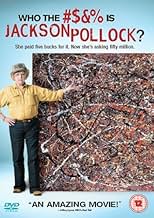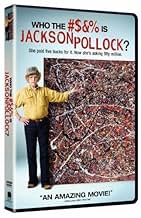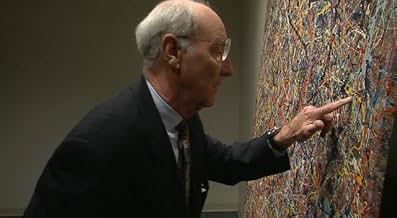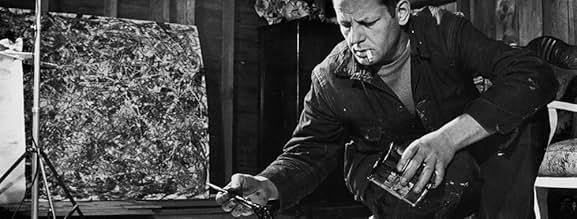AVALIAÇÃO DA IMDb
7,0/10
1,3 mil
SUA AVALIAÇÃO
Adicionar um enredo no seu idiomaIn this documentary, veteran filmmaker Harry Moses exposes the controversy in the world of high priced artwork. He paints a vivid picture of how art is bought and sold in America.In this documentary, veteran filmmaker Harry Moses exposes the controversy in the world of high priced artwork. He paints a vivid picture of how art is bought and sold in America.In this documentary, veteran filmmaker Harry Moses exposes the controversy in the world of high priced artwork. He paints a vivid picture of how art is bought and sold in America.
Avaliações em destaque
This was very entertaining and quite a story. However, many of the documentary's claims about the artworld are unfounded. They interview a small handful of slightly and some totally ego-centric people and label them as "the art world". In fact, most of the art world would love for this story to be true, that a truck driver has miraculously discovered a Jackson Pollack in perfect condition that found its way to a yard sale the whole United states away from where it was originally painted. The documentary neglects to focus on many overwhelming amount of evidence that call the piece a fraud and instead focus on the few details tat suggest its authenticity. This in effect portrays a sense of drama that is unreal. Good film though!
This one certainly makes good entertainment - which may be half the trouble.
It's the story of a California grandmother buying an abstract painting in a junk-shop for $5, and then being tipped-off that it looks like an original Jackson Pollock, worth up to $50 million, if proved genuine.
You don't have to dig very deep into the story before it starts to rattle, and not only because California is the natural habitat for wild theories of this sort. There is just too much of the pantomime about it all. The woman in question (Teri) is a long-distance truck-driver, who looks surprisingly genteel for one of that trade, as though she is posing as trailer-trash, with philistine opinions about abstract art - as echoed in the somewhat bowdlerised title of the film. She claims that a picture ought to 'look like something'. Well then, why choose such an unlikely present for a friend, when she could have found a nice harmless landscape or a bowl of fruit?
On come the experts, who are quick to remind us about 'provenance' - a word she claims she has never heard before. Thomas Hoving of the New York Met talks in an impossibly conceited way about his status as an authenticator of paintings, clearly acting a snob character-part, to get us taking sides in the big contest: connoisseurship v. folksy fireside wisdom.
Well, we certainly do take sides, even sometimes changing sides, as the evidence gradually comes to light. Apparently fingerprints have a lot to do with it, since Pollock despised the brush and palette. They even bring in a fingerprint expert from the Canadian Mounties - another over-theatrical touch. Two of the so-called experts insist that the painting is genuine, but it turns out that both of them were previously jailed for fraud. It is even claimed that the painting doesn't show enough evidence of Pollock's permanent drunkenness on the job!
Unfortunately, the closer you look at Teri, the more you conclude that she is just a little unhinged altogether. When she finally understood what provenance meant, she invented a colourful ancestry for the painting, and at least one expert swallowed it whole. Last heard-of, she had turned down a $9 million offer, still holding out for the big fifty, even though authentication is looking more elusive than ever. And it will take more than Joe Beam and his (excruciating) country song about her to get me voting against the smart-and-smarmy experts, as I believe I'm meant to.
It's the story of a California grandmother buying an abstract painting in a junk-shop for $5, and then being tipped-off that it looks like an original Jackson Pollock, worth up to $50 million, if proved genuine.
You don't have to dig very deep into the story before it starts to rattle, and not only because California is the natural habitat for wild theories of this sort. There is just too much of the pantomime about it all. The woman in question (Teri) is a long-distance truck-driver, who looks surprisingly genteel for one of that trade, as though she is posing as trailer-trash, with philistine opinions about abstract art - as echoed in the somewhat bowdlerised title of the film. She claims that a picture ought to 'look like something'. Well then, why choose such an unlikely present for a friend, when she could have found a nice harmless landscape or a bowl of fruit?
On come the experts, who are quick to remind us about 'provenance' - a word she claims she has never heard before. Thomas Hoving of the New York Met talks in an impossibly conceited way about his status as an authenticator of paintings, clearly acting a snob character-part, to get us taking sides in the big contest: connoisseurship v. folksy fireside wisdom.
Well, we certainly do take sides, even sometimes changing sides, as the evidence gradually comes to light. Apparently fingerprints have a lot to do with it, since Pollock despised the brush and palette. They even bring in a fingerprint expert from the Canadian Mounties - another over-theatrical touch. Two of the so-called experts insist that the painting is genuine, but it turns out that both of them were previously jailed for fraud. It is even claimed that the painting doesn't show enough evidence of Pollock's permanent drunkenness on the job!
Unfortunately, the closer you look at Teri, the more you conclude that she is just a little unhinged altogether. When she finally understood what provenance meant, she invented a colourful ancestry for the painting, and at least one expert swallowed it whole. Last heard-of, she had turned down a $9 million offer, still holding out for the big fifty, even though authentication is looking more elusive than ever. And it will take more than Joe Beam and his (excruciating) country song about her to get me voting against the smart-and-smarmy experts, as I believe I'm meant to.
This documentary is one of the most interesting ones I have ever seen. It's about an elderly woman who happens to drive a 16-wheeler truck for a living and who lives in a trailer park who buys what she believes is a Jackson Pollock painting from a thrift shop for $5. When she takes the painting to renowned art dealers, she is met with snobbery and disbelief that the painting is authentic. It's as much a tale about the clashing of the ultra rich high class society versus the the low class and least cultured society. There is a nice scene where a country musician sings to the woman and a group of her friends as they munch on chicken wings, smoke cigarettes and drink beer. On the flip side, the art experts all talk in pompous-accents. The most intriguing element of the story, however, is the forensic investigator who the woman hires to see if there is any evidence that can link Pollock to the painting. This documentary is a must see. Rating 8 of 10 stars.
This documentary tells the story of Teri Horton's crusade to get her $5 garage sale find certified as a genuine Jackson Pollock painting. I found myself really enjoying her feisty, earthy spirit, and contrasting it with the attitude of the "Art" world, which has been so dismissive of her claim, because it comes from outside their commonly held standards and beliefs. The contrast between her truck drivin', swearin', fried chicken & beer, trailer park life and the rarified "art world" people she was dealing with is both striking and funny. I must confess that, along with Teri, I knew very little about Jackson Pollock. Seeing this movie has impelled me to find out more about his interesting life.
This film is entertaining in many ways. The people in the film cover a pretty broad range, but I think it's safe to say that most of them are quirky. Quirky in a good way, though. The story was interesting as well as the whys and hows that originated the story. Without giving too much away, let's just say that the filmmaker does a good job. The story has the ever-popular David v Goliath, Individual v Large Corporate Mentality, and Common Man v The Elite that pretty much anyone can enjoy.
Knowledge of art and artists isn't necessary, and it isn't necessary for you to know the intricacies of the art world. It's all laid out for you in the film. You don't even have to be interested in art to enjoy the movie; you just have to be interested in watching a good story and letting the real-life personalities lead the way.
Knowledge of art and artists isn't necessary, and it isn't necessary for you to know the intricacies of the art world. It's all laid out for you in the film. You don't even have to be interested in art to enjoy the movie; you just have to be interested in watching a good story and letting the real-life personalities lead the way.
Você sabia?
- Citações
Teri Horton: Everybody knows that a fairy tale starts out 'Once Upon a Time', but a truck drivers tale starts out you 'ain't gonna believe this shit'!
- ConexõesFeatures Alma em Suplício (1945)
Principais escolhas
Faça login para avaliar e ver a lista de recomendações personalizadas
Detalhes
- Data de lançamento
- País de origem
- Central de atendimento oficial
- Idioma
- Também conhecido como
- Finding Jackson Pollock
- Empresas de produção
- Consulte mais créditos da empresa na IMDbPro
Bilheteria
- Faturamento bruto nos EUA e Canadá
- US$ 13.710
- Fim de semana de estreia nos EUA e Canadá
- US$ 5.526
- 19 de nov. de 2006
- Faturamento bruto mundial
- US$ 13.710
- Tempo de duração
- 1 h 14 min(74 min)
- Cor
- Mixagem de som
- Proporção
- 1.85 : 1
Contribua para esta página
Sugerir uma alteração ou adicionar conteúdo ausente










